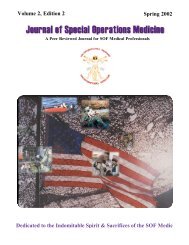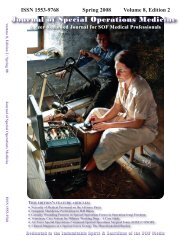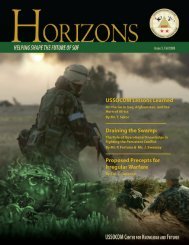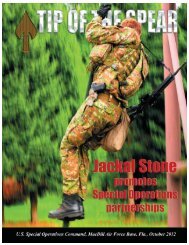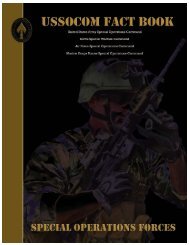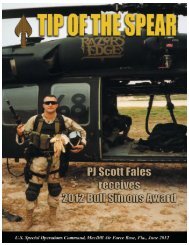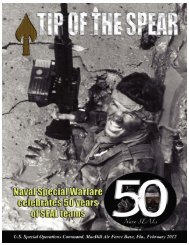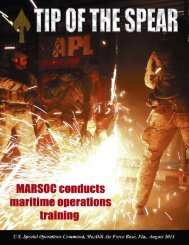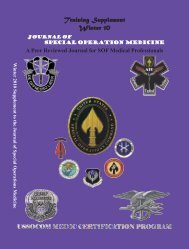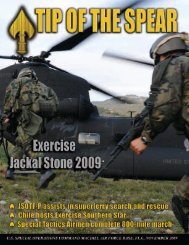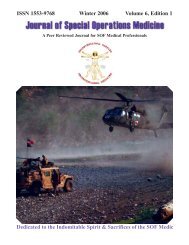oxygen tension within the cochlea. 7 As tinnitus is usuallyaccompanied by hearing loss, similar mechanismsare likely involved.THE CHARACTERISTICS OF NOISENoise, defined medically as an intense soundcapable of producing damage to the inner ear, leads toone of the most common conditions evaluated by otolaryngologist:noise induced hearing loss (NIHL).Noise can be further categorized as impulse noise, theproduct of explosive devices, or impact noise, causedby a collision of two hard surfaces. However described,both are produced by a sudden intense soundwave capable of causing inner ear damage. Excessivenoise exposure is the most common cause of hearingloss. 2,5,6 When an individual is exposed to sounds thatare too loud or loud sounds over a long period of time,sensitive structures of the inner ear can be damaged,resulting in NIHL. In humans, outer hair cells are usuallythe first type of sensory cell to be damaged. 2 Asthe hearing loss progresses and becomes more permanent,the degeneration involves both outer andinner hair cells. As the number of hair cells decreases,so does an individual’s hearing. With severe permanenthearing losses, both sensory and supporting cellsof the organ of Corti are missing. In these cases, thedegenerative layer of the organ of Corti is replaced byan undifferentiated layer of squamous epithelium andthe sensory nerve fibers are destroyed. 9 The type andamount of the resulting hearing loss are typically determinedby the following acoustic parameters: the intensityof the noise, the duration of exposure to thenoise, and the type of noise.Intensity of sound is measured in units calleddecibels (dB), a measurement of the amount of energyor air pressure moving from the source to our ear. 10,11,20The faintest sound humans with normal hearing candetect has a value between zero and ten decibels, andthe loudest sound the human ear can tolerate withoutpain is about 120 decibels. 10 Decibels are measuredlogarithmically, being 20 times the log of the ratio ofa particular sound pressure to a reference sound pressure.This means that as decibel intensity increasesby units of 20, each increase is 10 times the lower figure.Thus, 20 decibels is 10 times the intensity of 0decibels, and 40 decibels is 100 times as intense as 20decibels. 20 The Navy considers any sound above84dB as noise hazardous and having the potential tocause hearing damage if it is loud enough or lasts longenough. 4,5,10,12 The higher the intensity of the sound,the greater its potential to cause hearing damage. Singleexposures to impulse noises above 140 decibelshave the potential to cause permanent damage. 4 Accordingto the U.S. Army Center for Health and PreventativeMedicine, a gunner on a 105 millimetertowed howitzer experiences an impulse noise of183dB. 2,4 A servicemember who shoots a rifle is exposedto 157-163dB and a gunner with a machine gun,145dB. 2,5,10,12 Those suffering from an improvised explosivedevice (IED) are exposed to impulse noise inexcess of 180dB. 13Duration is defined as the length of time youare exposed to a noise. The louder the sound and moreprolonged the exposure, the shorter amount of time ittakes to cause hearing damage. For unprotected ears,the allowed exposure time decreases by one half foreach 5dB increase in the average noise level. 5,14 Forinstance, exposure is limited to eight hours per day at90dB, four hours per day at 95dB, and two hours perday at 100dB. The highest permissible noise exposurefor the unprotected ear is 115dB for 15 minutes perday. 5,14 Sounds of less than 75dB, even after long exposure,are unlikely to cause hearing loss.Hearing loss that results from exposure tosound with energy spread across a wide range of frequencies,such as impulses common to military settings,is often characterized by a gradual increase inthreshold as frequencies increase. The hearing losstypically reaches a maximum between 3000 and 6000hertz (Hz), followed by a return toward normal hearingat still higher frequencies. This pattern of hearing lossis often referred to as the “noise-notch” audiogram andis a clinical hallmark often used to distinguish noise-relatedhearing loss from that associated with other etiologies,such as ototoxic medications or aging. 2CHRONIC NOISED-INDUCED HEARING LOSS ANDACOUSTIC TRAUMAChronic NIHL is a disease process that occursgradually over many years of exposure to less intensenoise levels. It is generally caused by long term exposureto high intensity continuous noise with superimposedepisodic impact or impulse noise. The hearingloss associated with chronic NIHL is variable betweenindividuals, but the principal characteristics remain relativelyconsistent: 14-17• It is always sensorineural affecting the hair cells inthe inner ear.• It is nearly always bilateral and symmetric.• It will only rarely produce a profound loss.• It will not progress once noise exposure is stopped.• The higher frequencies (3000-6000Hz) are more affectedthan the lower frequencies, with the greatestloss usually occurring at 4000Hz.• Continuous noise is more damaging than intermittentnoise.• Tinnitus is often associated with NIHL.One exception to these features would be theindividual who had significant noise exposure secondaryto rifle shooting. In this case, an asymmetrical loss,with the ear nearest the gun barrel demonstratingslightly worse hearing, would be expected. 1434Journal of <strong>Special</strong> <strong>Operations</strong> Medicine Volume 9, Edition 3 / <strong>Summer</strong> 09
The development of chronic NIHL progressesthrough two phases. A brief hearing loss, more commonlyreferred to as a temporary threshold shift (TTS),characterizes the first stage. It occurs after noise exposureand completely resolves after a period of rest.Often reported as auditory fatigue, most studies indicatethat it is associated with no sensory cell damage orminimal, reversible cell changes. 14,18 Eventually, afterrepeated exposure to noises intense enough to produceTTS, a permanent threshold shift (PTS) will occur.This is an irreversible increase in hearing thresholdsand defines the second stage of chronic NIHL. At thispoint, there has been irreversible hair cell damage. 5,14,18In contrast to chronic NIHL, acoustic traumarefers to a sudden permanent hearing loss caused by asingle exposure to an intense sound. It occurs whenexcessive sound energy strikes the inner ear. Exposureto noise from firearm use during military service isprobably the most frequent etiology of acute acoustictrauma worldwide; therefore, it may be regarded as aprofessional disease in military populations. 19 Thesound pressure levels capable of causing acoustictrauma vary between individuals but average around130-140dB. 14 The hearing loss is sudden, sometimespainful, and is often followed by a new onset of tinnitus.For the vast majority of patients, tinnitus presentsas the most annoying symptom, with the risk for permanenttinnitus being considered more critical for thepatient than any degree of hearing loss resulting fromacoustic trauma. 19 Although the audiogram may showthe typical 3000-6000Hz sensorineural notch seen withchronic NIHL, down-sloping or flat audiograms thataffect a broad range of frequencies are more common.2,14,20 Direct mechanical injury to the sensory cellsof the cochlea is thought to be the mechanism of injuryin acoustic trauma.Noise exposure and NIHL are the most commoncause of tinnitus. 2,5,6 The relationship betweennoise exposure, NIHL and tinnitus has been addressedin a number of articles. A review of these studies waspresented by Axelsson & Barrenas, 1991, and it wasfound that noise exposure and NIHL were by far themost common cause of tinnitus; if “acoustic trauma”was included, at least one-in-three cases were causedby noise. 6 Tinnitus may occur following a single exposureto high-intensity impulse/impact noise (a shortburst of acoustic energy which can either be a singleburst or multiple bursts of energy), long-term exposureto repetitive impulses, long-term exposure to continuousnoise, or exposure to a combination of impulsesand continuous noise. 2,4,6THE “IMPACT” OF NOISE ON THE MILITARYA staggering number of Soldiers and Marinescaught in roadside bombings and firefights in Iraq andAfghanistan are coming home with ringing in theirears. High rates of tinnitus among patients exposed togunfire and explosive detonations suggest that impulse/impactnoise is likely to precipitate tinnitus associatedwith acoustic trauma, excessive noiseexposure, and NIHL. 2,4,6,10,12 According to researchpublished in the December 2005 issue of AmericanJournal of Audiology (AJA), Soldiers sent to battlezones are over 50 times more likely to suffer NIHL lossand/or tinnitus than Soldiers who do not deploy. 21 Accordingto a report released in 2007 by the House AppropriationsSubcommittee on Military Quality of Life,as a result of ongoing combat operations, one in threepost-deploying Soldiers report acute acoustic traumaand one in four report hearing loss and/or hearing complaintsto include tinnitus. 12From World War II and well through the VietnamWar, hearing damage has been a leading disability.According to the Department of Veterans Affairs,hearing damage is the number one disability in the Waron Terror, with some experts predicting the true tollcould take decades to become clear. 13 According to theAmerican Tinnitus Association (ATA), more will bespent on veterans’ disability compensation for tinnitusand other hearing conditions over the coming yearsthan for any other medical injuries from the Iraq andAfghan wars. 4 Between 2000 and 2005, the number ofveterans with tinnitus disabilities more than doubledand the amount paid to veterans with tinnitus disabilitieswent up more than two-and-a-half times. 4,22Presently, tinnitus is the most prevalent disabilityamong new cases added to Veterans Affairs numbers;nearly 70,000 of the more than 1.3 million troops whohave served in Afghanistan and Iraq are collecting disabilityfor tinnitus. 13,23 In fact, recent studies demonstratedthat 49-50% of all Soldiers exposed to explosiveblasts in Iraq and Afghanistan had tinnitus and 60%had tinnitus, often related to hearing loss. 4,13,22,24 Thenumber of servicemembers on disability because ofhearing damage is expected to grow 18% a year, withpayments totaling $1.1 billion annually by 2011. 4,13The economic consequences to the military forhearing impairment, to include tinnitus, include losttime and decreased productivity, loss of qualifiedworkers through medical disqualification, military disabilitysettlements, retraining, and expenses related tomedical treatment such as hearing aids and audiometrictesting. 10 While the economic consequences are significant,the military implications in a combat zone canbe deadly.A study published in the Army RD&A Bulletinin 1990, concluded that those with hearing impairmentswere 36% more likely to hear the wrong command, and30% were less likely to correctly identify their target. 4Additionally, it was noted that Soldiers with hearingimpairments only hit the enemy target 41% of the time,while Soldiers without hearing impairments hit theenemy target 94% of the time. Those with hearing impairmentswere 8% more likely to take the wrong tar-Tinnitus, a Military Epidemic:Is Hyperbaric Oxygen Therapy the Answer?35
- Page 1 and 2: Volume 9, Edition 3 / Summer 09 Jou
- Page 3 and 4: An 18D deworms a camel during a “
- Page 5 and 6: Field Evaluation and Management of
- Page 7 and 8: The circumferential anchoring strip
- Page 9 and 10: In doing so, all the skin is closed
- Page 11 and 12: NATO SOF Transformation and theDeve
- Page 13 and 14: current and future operations, thes
- Page 15 and 16: sion of a physician, and limited pr
- Page 17 and 18: REFERENCES1. James L. Jones, “A b
- Page 19 and 20: This article is the first of two me
- Page 21 and 22: Figure 4 : A Special Forces medic c
- Page 23 and 24: exposure. Conversely, the customary
- Page 25 and 26: 7. Ted Westmoreland. (2006). Attrib
- Page 27 and 28: first three days of injury, althoug
- Page 29 and 30: 9. Markgraf CG, Clifton GL, Moody M
- Page 31 and 32: the only sign of OCS may be elevate
- Page 33 and 34: E. The canthotomy allows for additi
- Page 35 and 36: 33. Rosdeutscher, J.D. and Stradelm
- Page 37: Tinnitus, a Military Epidemic:Is Hy
- Page 41 and 42: supplied by diffusion. During expos
- Page 43 and 44: similar to those of other authors,
- Page 45 and 46: promising effect on tinnitus. Howev
- Page 47 and 48: ADDITIONAL REFERENCESHoffmann, G; B
- Page 49 and 50: et al. demonstrated that both right
- Page 51 and 52: TYPICAL CHEST RADIOGRAPH FINDINGS I
- Page 53 and 54: 11. Norsk P, Bonde-Petersen F, Warb
- Page 55 and 56: ABSTRACTS FROM CURRENT LITERATUREMa
- Page 57 and 58: tourniquet times are less than 6 ho
- Page 59 and 60: tal from July 1999 to June 2002. In
- Page 61 and 62: Operation Sadbhavana: Winning Heart
- Page 63 and 64: CENTRAL RETINAL VEIN OCCLUSION IN A
- Page 65 and 66: of the X chromosome. Notable is tha
- Page 67 and 68: AUTHORS*75th Ranger Regiment6420 Da
- Page 69 and 70: Casualties presenting in overt shoc
- Page 71 and 72: PSYCHOLOGICAL RESILIENCE AND POSTDE
- Page 73 and 74: spondents without PTSD (M = 4.6, SD
- Page 75 and 76: patients, whereas the mean score of
- Page 77 and 78: 29. Whealin JM, Ruzek JI, Southwick
- Page 79 and 80: average, time between return from d
- Page 81 and 82: ing functioning in both PTSD (Zatzi
- Page 83 and 84: Editorial Comment on “Psychologic
- Page 85 and 86: Blackburn’s HeadhuntersPhilip Har
- Page 87 and 88: The Battle of Mogadishu:Firsthand A
- Page 89 and 90:
Task Force Ranger encountered enemy
- Page 91 and 92:
Peter J. Benson, MDCOL, USACommand
- Page 93 and 94:
Numerous military and civilian gove
- Page 95 and 96:
Anthony M. Griffay, MDCAPT, USNComm
- Page 97 and 98:
This is a great read that speaks di
- Page 99 and 100:
and twenty-eight. Rabies immune glo
- Page 101 and 102:
Rhett Wallace MD FAAFPLTC MC SFS DM
- Page 103 and 104:
LTC Craig A. Myatt, Ph.D., HQ USSOC
- Page 105 and 106:
LTC Bill Bosworth, DVM, USSOCOM Vet
- Page 107 and 108:
Europe, Mideast, Africa and SWAU.S.
- Page 109 and 110:
SOF and SOF Medicine Book ListWe ha
- Page 111 and 112:
TITLE AUTHOR ISBNCohesion, the Key
- Page 113 and 114:
TITLE AUTHOR ISBNI Acted from Princ
- Page 115 and 116:
TITLE AUTHOR ISBNRats, Lice, & Hist
- Page 117 and 118:
TITLE AUTHOR ISBNThe Healer’s Roa
- Page 119 and 120:
TITLE AUTHOR ISBNGuerilla warfare N
- Page 121 and 122:
TITLEAUTHORBlack Eagles(Fiction)Bla
- Page 123 and 124:
TITLE(Good section on Merrill’s M
- Page 125 and 126:
GENERAL REFERENCESALERTS & THREATSB
- Page 127 and 128:
Aviation Medicine Resources: http:/
- Page 129 and 130:
LABORATORYClinical Lab Science Reso
- Page 131 and 132:
A 11 year old boy whose tibia conti
- Page 133 and 134:
Meet Your JSOM StaffEXECUTIVE EDITO
- Page 135 and 136:
Special Forces Aidman's PledgeAs a



